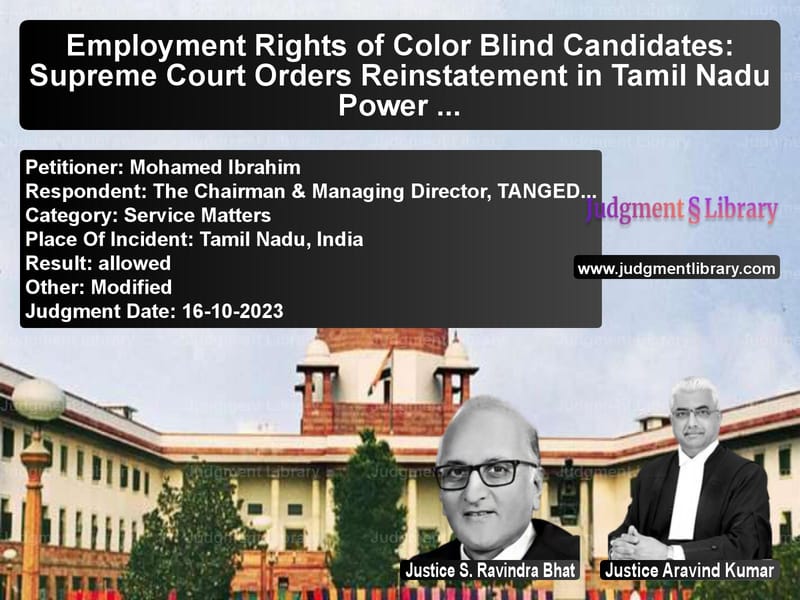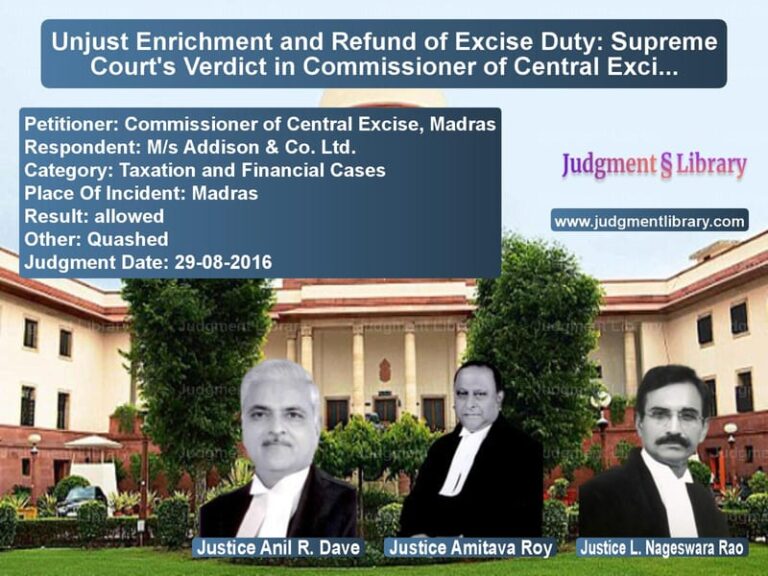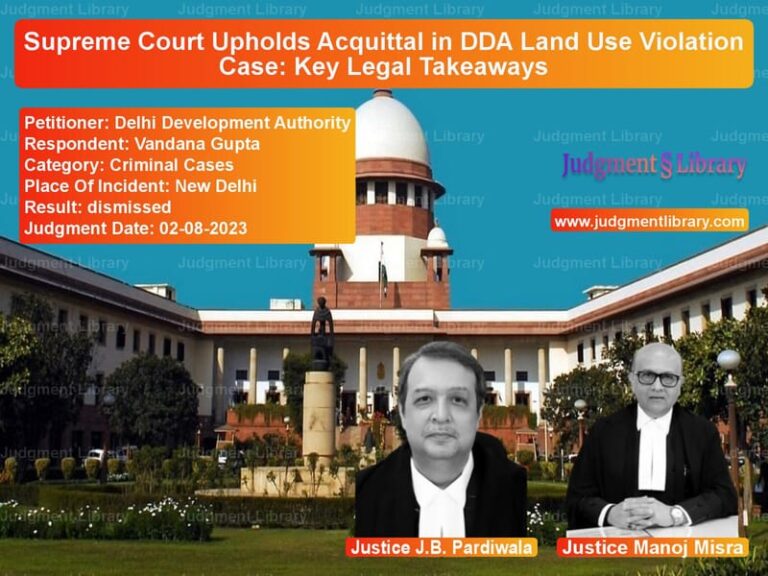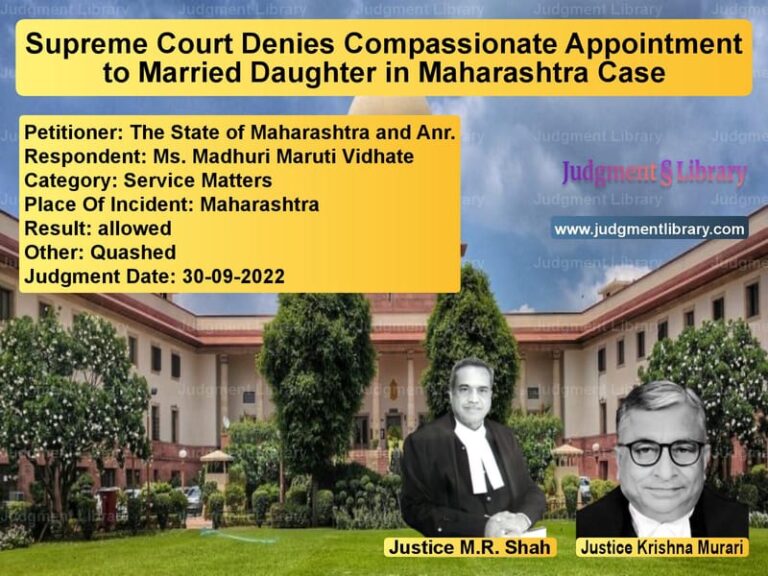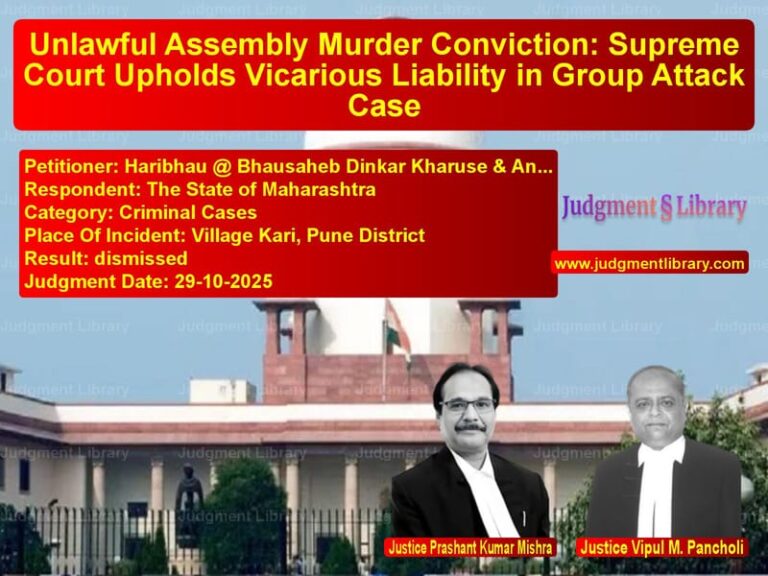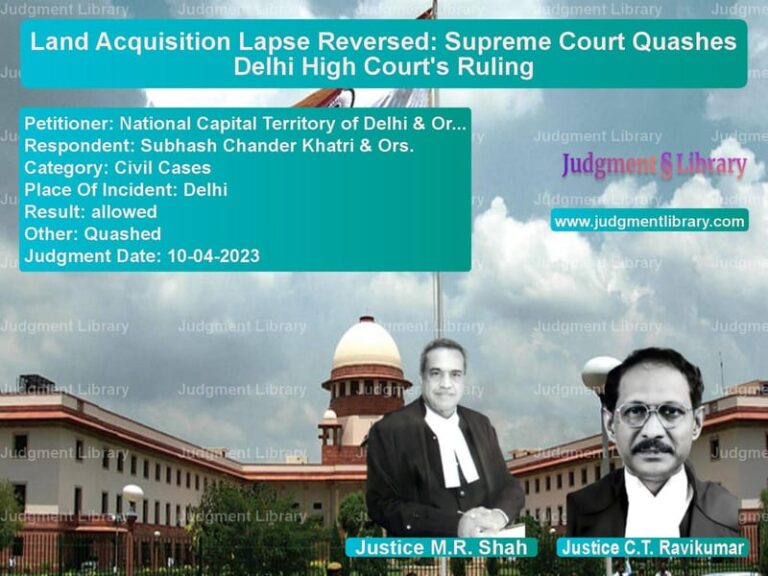Employment Rights of Color Blind Candidates: Supreme Court Orders Reinstatement in Tamil Nadu Power Corporation
The Supreme Court of India recently ruled in Mohamed Ibrahim v. The Chairman & Managing Director, TANGEDCO & Others, addressing the rights of color-blind candidates in public sector employment. The case focused on whether a candidate selected for the post of Assistant Engineer (Electrical) in the Tamil Nadu Generation and Distribution Corporation Limited (TANGEDCO) could be denied appointment solely due to color blindness.
Background of the Case
The appellant, Mohamed Ibrahim, had successfully cleared the recruitment process for the post of Assistant Engineer (Electrical) and was issued an appointment letter in March 2017. However, before assuming duties, he was required to undergo a medical examination at a government hospital. The medical examination revealed that he had defective color vision (color blindness).
Following this, the appellant was subjected to multiple medical reviews, including by the Regional Medical Board (RMB), which stated in its report dated February 23, 2018, that fitness could not be given as there were no prescribed norms regarding color vision for the post of Assistant Engineer. Based on this report, the employer (TANGEDCO) refused to allow the appellant to join duty and later terminated his selection in May 2020.
The appellant challenged the decision in the Madras High Court, which ruled in his favor on March 17, 2021, directing TANGEDCO to reinstate him. However, TANGEDCO appealed to the Division Bench, which overturned the Single Judge’s order, leading the appellant to approach the Supreme Court.
Legal Issues Raised
- Whether the denial of appointment based on color blindness was arbitrary when the recruitment notification did not specify any vision-related criteria.
- Whether TANGEDCO was justified in canceling the selection without officially prescribed norms disqualifying candidates with color blindness.
- Whether reasonable accommodation could be provided to the appellant under the Rights of Persons with Disabilities Act, 2016.
Arguments by the Appellant (Mohamed Ibrahim)
- The recruitment notification did not mention color vision as a disqualification, making the rejection arbitrary.
- The medical report only stated color blindness but did not assess its impact on his ability to perform the job.
- There are multiple roles within TANGEDCO where color vision is not a critical requirement.
- The appellant was willing to work in any department or role where color blindness would not affect job performance.
Arguments by the Respondents (TANGEDCO)
- The post of Assistant Engineer (Electrical) involves handling electrical equipment with color-coded wires and signals.
- Allowing a color-blind person in such a role could pose a safety risk to the appellant, the organization, and the public.
- Medical reports confirmed the appellant had difficulty distinguishing between specific colors, which is crucial for electrical engineering tasks.
- The organization had a right to ensure safety standards in recruitment.
Supreme Court’s Observations
The Supreme Court analyzed the principles of reasonable accommodation and employment rights under the Rights of Persons with Disabilities Act, 2016. The Court made the following key observations:
- TANGEDCO had not prescribed any medical criteria for color vision in its recruitment notification.
- Medical experts had only identified defective color vision but had not concluded that the appellant was unfit for the role.
- There are multiple departments and roles within TANGEDCO where color blindness would not affect work performance.
- Employers have an obligation to make reasonable accommodations for candidates with disabilities.
The Court referred to previous judgments, including:
- Jeeja Ghosh v. Union of India (2016) – Emphasized equality and non-discrimination for persons with disabilities.
- Vikash Kumar v. UPSC (2021) – Stated that reasonable accommodation is a part of the right to equality.
- Nandkumar Narayanrao Ghodmare v. State of Maharashtra (1995) – Held that a color-blind candidate could not be denied employment if alternative roles were available.
The Court also examined the Rights of Persons with Disabilities Act, 2016, particularly the provision of reasonable accommodation, which requires necessary modifications to ensure equal opportunities for persons with disabilities.
Final Judgment
The Supreme Court allowed the appeal, set aside the decision of the Division Bench of the Madras High Court, and directed TANGEDCO to:
- Reinstate the appellant as Assistant Engineer (Electrical) from the date of his termination.
- Provide suitable accommodations by posting him in a department where color blindness does not affect performance.
- Grant 50% back wages and restore seniority from the original date of appointment.
Implications of the Judgment
This ruling is a landmark decision for employment rights, particularly for individuals with minor disabilities. The key takeaways include:
- Recruitment rules must be clear – If an employer intends to disqualify candidates based on medical conditions, it must be specified in the job notification.
- Reasonable accommodation is essential – Organizations must explore ways to accommodate employees with disabilities rather than outright rejecting them.
- Non-discrimination in public employment – Public sector employers cannot introduce additional disqualifications not mentioned in the recruitment process.
- Legal protection for employees – This case sets a precedent for other candidates who may be unfairly denied jobs due to minor disabilities.
The Supreme Court’s decision strengthens protections for employees and ensures fair hiring practices in public sector jobs.
Petitioner Name: Mohamed Ibrahim.Respondent Name: The Chairman & Managing Director, TANGEDCO & Others.Judgment By: Justice S. Ravindra Bhat, Justice Aravind Kumar.Place Of Incident: Tamil Nadu, India.Judgment Date: 16-10-2023.
Don’t miss out on the full details! Download the complete judgment in PDF format below and gain valuable insights instantly!
Download Judgment: mohamed-ibrahim-vs-the-chairman-&-manag-supreme-court-of-india-judgment-dated-16-10-2023.pdf
Directly Download Judgment: Directly download this Judgment
See all petitions in Employment Disputes
See all petitions in Recruitment Policies
See all petitions in Public Sector Employees
See all petitions in Judgment by S Ravindra Bhat
See all petitions in Judgment by Aravind Kumar
See all petitions in allowed
See all petitions in Modified
See all petitions in supreme court of India judgments October 2023
See all petitions in 2023 judgments
See all posts in Service Matters Category
See all allowed petitions in Service Matters Category
See all Dismissed petitions in Service Matters Category
See all partially allowed petitions in Service Matters Category

